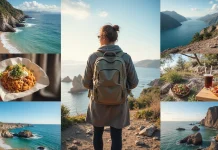Embrace the Art of Budget Travel
Rethinking Accommodation Options
Go Beyond Hotels
Hotels can quickly drain your budget, especially in popular destinations. Consider alternative accommodations such as hostels, guesthouses, or bed and breakfasts. If you're open to a bit of adventure, couchsurfing is an excellent way to meet locals and stay for free. Platforms like Airbnb and VRBO also provide cost-effective lodging options, often equipped with kitchens that allow you to prepare your meals and save even more.
House-Sitting for Free Stays
House-sitting is another creative solution to accommodation costs. Websites like TrustedHousesitters connect travelers with homeowners who need someone to care for their home and pets while they're away. This arrangement offers free lodging in exchange for a few responsibilities, and it allows you to experience living like a local.
Smart Transportation Choices
Fly Cheap and Smart
When it comes to flying, flexibility is key to finding cheap flights. Use fare comparison websites such as Skyscanner, Google Flights, and Kayak to discover the best deals. Set fare alerts and consider flying on weekdays or during off-peak hours to snag better prices. Additionally, budget airlines can offer significant savings, albeit with fewer frills. Be sure to watch out for hidden fees, such as charges for checked baggage or seat selection.
Consider Alternative Transport
Trains and buses can be a more affordable and scenic way to travel between destinations, especially in regions with robust public transportation systems. Apps like Rome2rio and Omio can help you compare options and book tickets. Additionally, ridesharing services like BlaBlaCar offer a communal travel experience at reduced costs. If you’re traveling within a city, explore options like renting a bike or using public buses and subways to save even more.
Master the Art of Packing
Pack Light and Right
Packing can significantly affect your travel budget and experience. By traveling light, you avoid extra baggage fees, make transportation easier, and lower the risk of losing items along the way. Prioritize versatile clothing that can be layered and mixed and matched. Use packing cubes to organize efficiently and consider a digital luggage scale to prevent surprises at the airport.
Essential Gear for Budget Travelers
Having the right gear can mean significant savings on the road. A reusable water bottle, for instance, reduces the need to buy expensive bottled water. A compact travel towel can come in handy for spontaneous beach trips and hostel showers. Packing snacks and a reusable grocery bag helps save on food costs and supports eco-friendly practices. You might also find a universal travel adapter and a multi-tool to be valuable inclusions for your packing list.
Navigating Food and Dining
Eat Like a Local
One of the best ways to stretch your food budget is by eating where the locals eat. Avoid tourist traps with overpriced cuisine and seek out local markets, food stalls, and family-owned restaurants where you can sample authentic dishes at reasonable prices. Apps like Yelp, Google Maps reviews, or even just talking with locals can point you to these hidden culinary gems.
Cook and Save
For those with access to cooking facilities, grocery shopping and cooking your own meals can drastically reduce food expenses. Visiting local markets not only provides inexpensive produce but also an immersive cultural experience. Focus on buying staple ingredients that allow for multiple meal variations, such as rice, pasta, and fresh vegetables.
Take Advantage of Discounts
Look out for happy hours, lunch specials, and buffet deals to eat well without overspending. Some establishments offer reduced rates during less busy times. Tourist areas may also have discount booklets or cards that provide deals at participating restaurants.
Clever Budget Hacks for Savings
Utilize Discounts and Rewards
Explore Discount Programs
Discount cards and coupons are often overlooked but can lead to substantial savings. Look for city-specific tourism cards that offer discounted or free entrance to museums, attractions, and transportation. For longer stays, consider grocery store loyalty cards, which can provide discounts on essentials.
Leverage Travel Rewards Programs
Frequent flyer miles and hotel loyalty programs are excellent ways to travel more for less. Accumulating points through everyday spending on travel reward credit cards can lead to free flights, upgrades, and hotel stays. Always check for opportunities to earn additional bonuses through partnered promotions and be mindful of any expiration dates attached to your rewards.
Free and Low-Cost Activities
Delight in Nature and Public Spaces
Nature offers limitless entertainment that can be enjoyed at little to no cost. Seek out local parks, hiking trails, and beaches where you can bask in the beauty of your destination. Additionally, many cities maintain botanical gardens, public art installations, and free public events, providing ample opportunities to explore without spending a dime.
Free Walking Tours and Cultural Experiences
Many cities offer free walking tours led by knowledgeable guides passionate about sharing their city's history and culture. Though generally tip-based, these tours provide an affordable introduction to major sights and hidden corners alike. Museums and cultural sites frequently have discounted or free admission days, particularly if you visit during off-peak hours.
Strategic Planning for Maximum Savings
Travel During Off-Peak Seasons
Timing your trips during shoulder seasons—just before or shortly after the peak tourist months—can result in substantial savings on flights, accommodations, and attractions while still enjoying pleasant weather. Off-peak travel typically means fewer crowds, offering a more authentic and relaxed travel experience.
Flexible Itineraries for Greater Flexibility
The more flexible your travel plans, the easier it becomes to capitalize on unexpected deals and opportunities. Rather than sticking to rigid departure and arrival dates, leave some wiggle room for adjusting plans to coincide with last-minute deals. This flexibility extends to locations, too; being open to diverse destinations can uncover unique and affordable travel options.
Spontaneity Meets Planning
Balancing spontaneity with planning is an art. Embrace unplanned detours while setting a loose itinerary as a backbone for your adventures. Prioritize key experiences but leave space for spontaneous decisions that lead to unexpected discoveries and savings, such as last-minute discounts or local-led excursions offering special prices.
Smart Financial Management
Manage Money Like a Pro
Choose the Right Banking Tools
Reducing transaction fees and gaining access to favorable exchange rates are vital for budget travelers. Opt for a bank or credit card that offers no foreign transaction fees and favorable ATM withdrawal terms. Additionally, having a small reserve of local currency on hand for emergencies can prevent overpaying due to exchange rate fluctuations.
Stick to a Budget
Establishing a daily budget helps control expenses and prioritizes spending on things that truly matter to you. Track your spending with budgeting apps, and categorize expenses to ensure you stay within your limits. Small sacrifices—such as temporarily diverting dining-out funds—can be shifted to experiences that provide lasting memories.
Travel Insurance is Essential
While it’s tempting to skip travel insurance to save money, a small investment in coverage can prevent significant financial outlays due to unexpected events. Whether it's for sudden illness, travel delays, or lost luggage, having an adequate travel insurance plan provides peace of mind and financial protection.
Conclusion is a Good Idea But Unnecessary Here
By employing these strategies and maintaining an open mind and adventurous spirit, you’ll not only travel more and spend less, but enrich each journey with meaningful experiences and connections. Traveling on a budget can be both an economical and rewarding adventure, lifting you up into cultures and landscapes beyond the ordinary.































